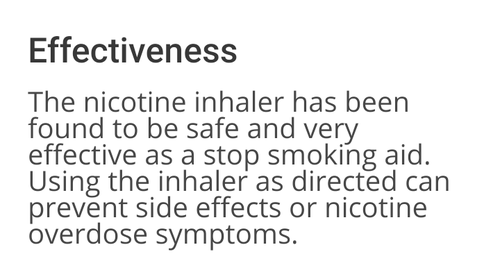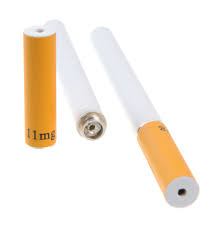https://www.nationaljewish.org/treatment-programs/medications/tobacco/nicotine-inhaler
Nicotine Inhaler
The nicotine inhaler (Nicotrol Inhaler) is a nicotine replacement medicine. Like other nicotine replacement medicines, it has been found to double quitting success rates. It is available only by prescription. It has the advantage of simulating cigarette smoking because the inhaler is shaped like a cigarette. With the inhaler, nicotine is administered quickly, unlike the patch.
How to Use a Nicotine Inhaler
The inhaler is shaped like a cigarette. You inhale deeply to receive a vaporized dose of nicotine, similar to inhaling when smoking a cigarette. However, the inhaler does not have all of the cancer and disease-causing smoke and chemicals like actual cigarettes. The nicotine is deposited in the mouth, not the lungs.
Each inhaler package includes a mouthpiece and 42 cartridges of nicotine. Treatment takes place in two stages. During the first part of quitting (up to 12 weeks), you use as many cartridges as you need (at least six, but no more than 16 daily) to soothe your cravings for cigarettes. During the second part of quitting (six to 12 weeks), you gradually reduce the amount you use each day until you are nicotine free. It is important to gradually cut back on the inhaler after the first three months. Do not use for more than six months unless recommended by your doctor.
For best results, puff often on each cartridge for about 20 minutes. Remember to clean the mouthpiece regularly with soap and water.
Warnings
Tell your doctor if you have or have ever had:
Ask a doctor or pharmacist before use if you are:
The nicotine inhaler may cause side effects.
Stop use and ask a doctor if you develop:
Effectiveness
The nicotine inhaler has been found to be safe and very effective as a stop smoking aid. Using the inhaler as directed can prevent side effects or nicotine overdose symptoms.
References
Fiore MC, Jaén CR, Baker TB, et al. Treating Tobacco Use and Dependence: 2008 Update. Clinical Practice Guideline. Rockville, MD: U.S. Department of Health and Human Services. Public Health Service. May 2008.
US Department of Health and Human Services. (2000). Reducing Tobacco Use: A report of the surgeon general. Atlanta, Georgia: USDHHS, Center for Disease Control and Prevention, National Center for Chronic Disease Prevention and Health, Office on Smoking and Health.
Please note, National Jewish Health does not endorse specific products. The names of NRT products are included to familiarize the consumer with the various products that are available.
This information has been approved by Thomas Ylioja, MSW, PhD (December 2018).
Nicotine Inhaler
The nicotine inhaler (Nicotrol Inhaler) is a nicotine replacement medicine. Like other nicotine replacement medicines, it has been found to double quitting success rates. It is available only by prescription. It has the advantage of simulating cigarette smoking because the inhaler is shaped like a cigarette. With the inhaler, nicotine is administered quickly, unlike the patch.
How to Use a Nicotine Inhaler
The inhaler is shaped like a cigarette. You inhale deeply to receive a vaporized dose of nicotine, similar to inhaling when smoking a cigarette. However, the inhaler does not have all of the cancer and disease-causing smoke and chemicals like actual cigarettes. The nicotine is deposited in the mouth, not the lungs.
Each inhaler package includes a mouthpiece and 42 cartridges of nicotine. Treatment takes place in two stages. During the first part of quitting (up to 12 weeks), you use as many cartridges as you need (at least six, but no more than 16 daily) to soothe your cravings for cigarettes. During the second part of quitting (six to 12 weeks), you gradually reduce the amount you use each day until you are nicotine free. It is important to gradually cut back on the inhaler after the first three months. Do not use for more than six months unless recommended by your doctor.
For best results, puff often on each cartridge for about 20 minutes. Remember to clean the mouthpiece regularly with soap and water.
Warnings
Tell your doctor if you have or have ever had:
- Heart attack
- Irregular heart rate
- Angina or uncontrolled high blood pressure
- Ulcers
- Pheochromocytoma
- Overactive thyroid
- Diabetes
- Kidney or liver disease
- Asthma
- Pulmonary or bronchospastic disease
Ask a doctor or pharmacist before use if you are:
- Using a non-nicotine stop smoking drug
- Taking prescription medicine for depression or asthma; your prescription dose may need to be adjusted
- Using a prescription and/or nonprescription medication(s), especially acetaminophen (Tylenol), caffeine, diuretics ('water pills'), imipramine (Tofranil), insulin, medications for high blood pressure, oxazepam (Serax), pentazocine (Talwin, Talwin NX, Talacen), propoxyphene (Darvon, E-Lor), propranolol (Inderal), theophylline (Theo-Dur, Slo-bid), and vitamins
The nicotine inhaler may cause side effects.
Stop use and ask a doctor if you develop:
- Irregular heartbeat or palpitations
- Allergies
- Coughing
- Serious pain
- Ulcers or bleeding
Effectiveness
The nicotine inhaler has been found to be safe and very effective as a stop smoking aid. Using the inhaler as directed can prevent side effects or nicotine overdose symptoms.
References
Fiore MC, Jaén CR, Baker TB, et al. Treating Tobacco Use and Dependence: 2008 Update. Clinical Practice Guideline. Rockville, MD: U.S. Department of Health and Human Services. Public Health Service. May 2008.
US Department of Health and Human Services. (2000). Reducing Tobacco Use: A report of the surgeon general. Atlanta, Georgia: USDHHS, Center for Disease Control and Prevention, National Center for Chronic Disease Prevention and Health, Office on Smoking and Health.
Please note, National Jewish Health does not endorse specific products. The names of NRT products are included to familiarize the consumer with the various products that are available.
This information has been approved by Thomas Ylioja, MSW, PhD (December 2018).






